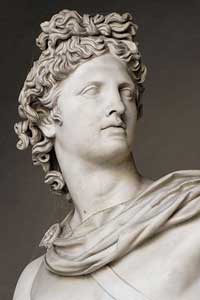This content is associated with The Open University's History courses and qualifications.
 The Greek god, Apollo
The original series of Star Trek (1966 to 1969) was particularly obvious in drawing upon human history, with the crew of the USS Enterprise encountering the planet where everything is like Prohibition-era Chicago (‘A Piece of the Action’, 1968), the planet where everything is like Nazi Germany (‘Patterns of Force’, 1968), and the planet where everything is like ancient Rome (‘Bread and Circuses’, 1968).
The Greek god, Apollo
The original series of Star Trek (1966 to 1969) was particularly obvious in drawing upon human history, with the crew of the USS Enterprise encountering the planet where everything is like Prohibition-era Chicago (‘A Piece of the Action’, 1968), the planet where everything is like Nazi Germany (‘Patterns of Force’, 1968), and the planet where everything is like ancient Rome (‘Bread and Circuses’, 1968).
The show had some interesting engagements with the ancient Greeks, such as ‘Plato’s Stepchildren’ (1968), a not-altogether successful encounter with fourth-century philosophy, and ‘Elaan of Troius’ (1968), a retelling of Trojan legend on an interplanetary scale.
The most interesting is ‘Who Mourns for Adonais?’ (1967). In this, the Enterprise crew encounter someone who claims to be the Greek god Apollo. It’s a variation on a typical Star Trek theme, the being possessed of near-infinite power but lacking the full maturity to use that power benevolently.
Two aspects are particularly interesting. One is Apollo’s virility. He spends the entire episode dressed in a very short, off-the-shoulder, gold lamé tunic. This should be the campest thing ever, yet, as played by Michael Forest, there is not the slightest hint of camp.
Instead, he is able to seduce a sensible female scientist, Carolyn Palomas (Leslie Parrish), who shouldn’t even believe in irrational things like gods.
The other point is that the episode leaves open whether Apollo is a god. Captain Kirk, of course, hypothesises that Apollo and the other Greek gods were aliens who landed on earth thousands of years ago, and were worshipped.
But Apollo never admits that he is anything other than a Greek god, and it is left to the viewer to decide.






Rate and Review
Rate this article
Review this article
Log into OpenLearn to leave reviews and join in the conversation.
Article reviews